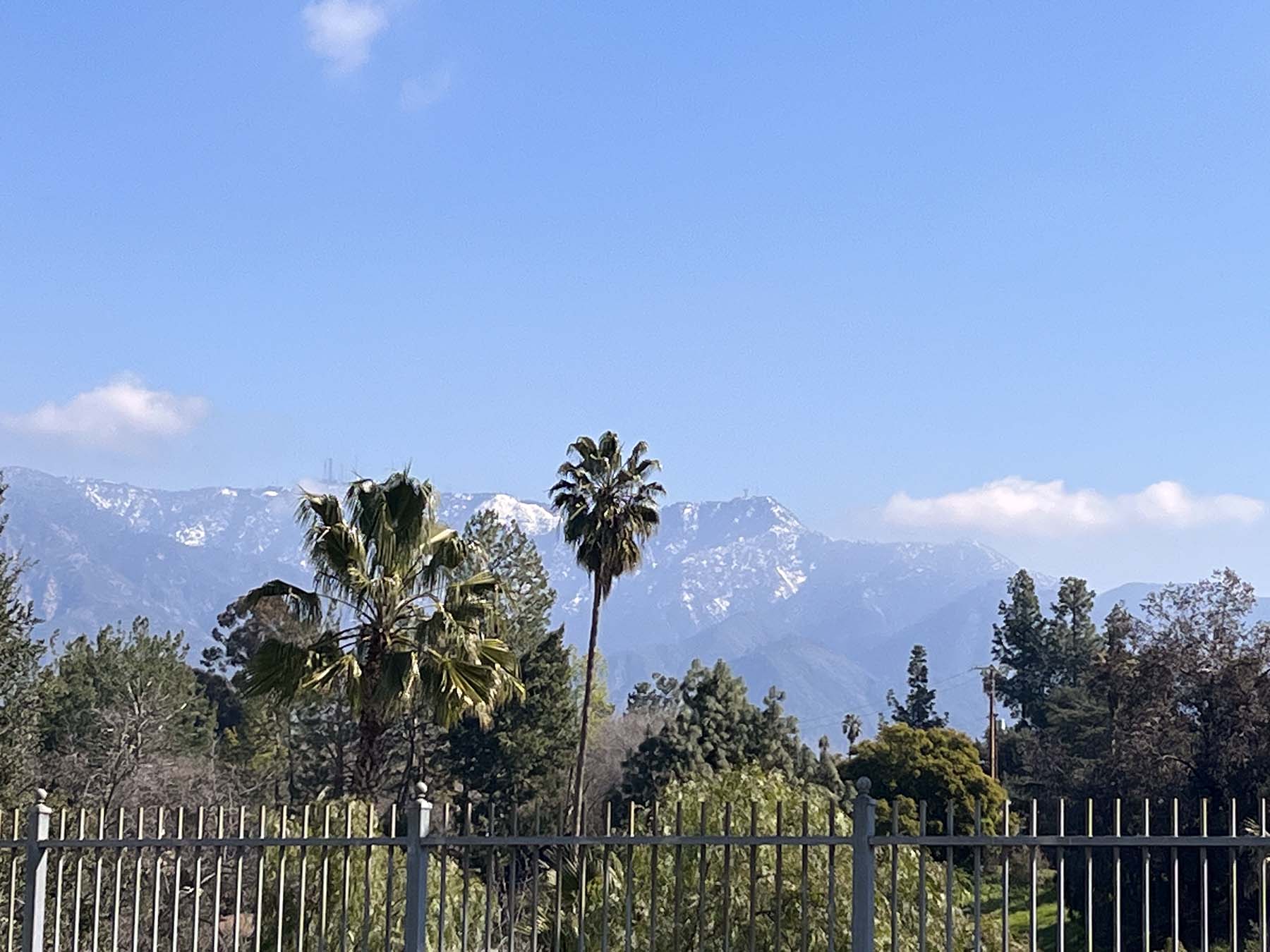Walk with me. A first exploration of a neighborhood, with many more to come, I’m sure. Share my pleasure at discovering diverse sights, some funny, some spectacular, some moving, all embedded in a long history of a place that was originally inhabited by the Hahamongna (or Hahamog’na) tribe of the Tongva people. Spanish colonialist built the San Gabriel Mission a bit southeast of Altadena before they settled Los Angeles.

The Mexican government had dibs on the region in 1826 after they had claimed independence from Spain, before it came into the possession of the US in 1848. A 14,403-acre area called Rancho San Pascual* was given to Mexican citizen Juan Maríne in 1834 as a land grant. The rancho (which covered parts of modern-day Pasadena, South Pasadena, Alhambra, San Gabriel, San Marino, and San Pasqual in addition to Altadena,) was eventually parceled into many distinct neighborhoods. (Much of what I learned comes from the Altadena Historical Society, founded in 1935.)

Non-hispanic immigrants started to move into the area that is bounded on three sides by wilderness (the Arroyo Seco, Angeles National Forest, and Eaton Canyon), and on the south by the city of Pasadena, founding nurseries and farms. One of the new nurseries owners, Byron O. Clark, coined the name “Altadena” from Spanish “alta”, meaning upper, and “dena”, a Chippewa word meaning “crown of the valley”. This was a reference to the fact that Altadena was in higher elevation or north of Pasadena, which was founded years earlier. His friends, the so-called “fathers of Altadena,” John and Frederick Woodbury who brought development to the subdivision with hotels, roads, train station all attracting new settlers, were given permission by Clark to use this name in 1887.





Fences echo diversity – from Piet Mondrian to rushes.
Main crops grown were grapes, expanding into oranges, olives, walnuts — and in the early 20th century, dates, avocados, and commercial fruit and ornamental plant nurseries. The vineyards were one of the reason that Altadena insisted on staying unincorporated, since Pasadena which tried to stall the area was ruled by temperance minded Mid-western immigrants and serious about prohibition. To this day, that independence has held, with around 40.000 citizens preferring a looser political structure.



Altadena originally attracted rich folks, in addition to the farmers, with many millionaires building large estates to flee the heat of the summer wherever they lived. An originally 96% white population saw a large change with a subsequent flurry of white flight during the 1960s and 1970s civil rights movement, the Vietnam War protests and issues of school integration combined with the ever increasing, thickening layer of smoke from L.A. that piled up against the surrounding mountains. Non-white residents moved in, establishing Altadena as one of the most diverse places of the region today. Ethnic diversity is reflected in civic life, making for a wonderfully integrated community.



Horses hang out in front yards, unicorns in garages. Chatted with a friendly leather worker who restored a saddle in his garden.



On Sundays, families meet in the public parks for soccer games, taking their picknick lunches and blowing bubbles for the kiddos. You hear predominantly Spanish, but other foreign languages as well. I had just read Clint Smith’s new poem Nomenclature in The Atlantic and was thinking of how language of familial origin gets lost across generations for so many reasons, a topic to be explored at a future point. The facts that words with similar sounds can mean different things, or change meaning with just a barely perceptible sound switch fascinates me to no end – fully aware that none in my family will ever share the complexities of the German language, and not really sad about it, as long as they use the riches of language of their own. But that would be different if the language of origin is at the verge of disappearance, as for so many enslaved tribes, or small minority groups.




Nomenclature
By Clint Smith
After Safia Elhillo
Your mother’s mother came from Igboland
though she did not teach your mother her language.
We gave you your name in a language we don’t understand
because gravity is still there
even when we cannot see it in our hands.
I ask your mother’s mother to teach me
some of the words in hopes of tracing
the shadow of someone else’s tongue.
The same word in Igbo, she tells me, may have four different
meanings depending on how your mouth bends around
each syllable. In writing, you cannot observe the difference.
The Igbo word n’anya means “sight”
The Igbo word n’anya means “love”
Your grandmother said,
I cannot remember the sight of my village
or Your grandmother said,
I cannot remember the love of my village
Your grandmother’s heart is forgetting
orYour grandmother’s heart is broken
Your grandmother said,
We escaped the war and hid from every person in sight
orYour grandmother said,
We escaped the war and hid from every person in love
Your grandmother was running from danger
orYour grandmother was running from vulnerability
Your grandmother said,
My greatest joy is the sight of my grandchild
or Your grandmother said,
My greatest joy is the love of my grandchild
Your grandmother wants you present
or Your grandmother wants you home.

In any case, hearing everyone’s supportive screams during the game produced joy – like any sense of community in action. Kids getting ice cream, just dropping their mini scooters, people proud of their old timers.





And since today is International Women’s day I’ll celebrate one of the strongest female wordsmiths of the English language and equally strong champion of community, MacArthur fellow Octavia E. Butler, who lived and is buried in Altadena. Here is funky music compiled in her honor.






Sara Lee Silberman
Great walk [and accompanying information], thank you! I trust all those black clouds did not spring forth and soak you while you were out and about!